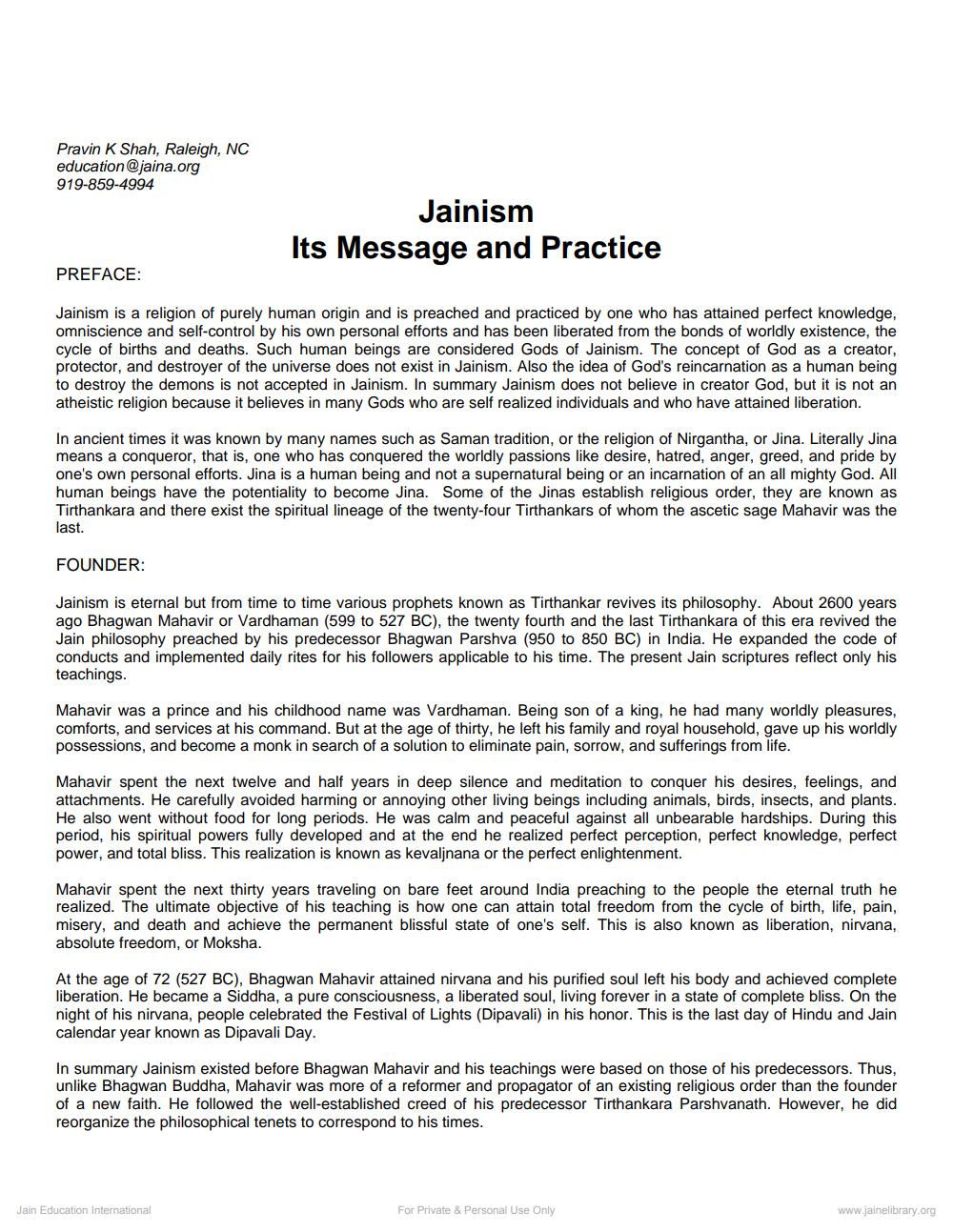Book Title: Jainism Author(s): Pravin K Shah Publisher: JAINA Education Committee View full book textPage 1
________________ Pravin K Shah, Raleigh, NC education @jaina.org 919-859-4994 Jainism Its Message and Practice PREFACE: Jainism is a religion of purely human origin and is preached and practiced by one who has attained perfect knowledge, omniscience and self-control by his own personal efforts and has been liberated from the bonds of worldly existence, the cycle of births and deaths. Such human beings are considered Gods of Jainism. The concept of God as a creator, protector, and destroyer of the universe does not exist in Jainism. Also the idea of God's reincarnation as a human being to destroy the demons is not accepted in Jainism. In summary Jainism does not believe in creator God, but it is not an atheistic religion because it believes in many Gods who are self realized individuals and who have attained liberation. In ancient times it was known by many names such as Saman tradition, or the religion of Nirgantha, or Jina. Literally Jina means a conqueror, that is, one who has conquered the worldly passions like desire, hatred, anger, greed, and pride by one's own personal efforts. Jina is a human being and not a supernatural being or an incarnation of an all mighty God. All human beings have the potentiality to become Jina. Some of the Jinas establish religious order, they are known as Tirthankara and there exist the spiritual lineage of the twenty-four Tirthankars of whom the ascetic sage Mahavir was the last. FOUNDER: Jainism is eternal but from time to time various prophets known as Tirthankar revives its philosophy. About 2600 years ago Bhagwan Mahavir or Vardhaman (599 to 527 BC), the twenty fourth and the last Tirthankara of this era revived the Jain philosophy preached by his predecessor Bhagwan Parshva (950 to 850 BC) in India. He expanded the code of conducts and implemented daily rites for his followers applicable to his time. The present Jain scriptures reflect only his teachings. Mahavir was a prince and his childhood name was Vardhaman. Being son of a king, he had many worldly pleasures. comforts, and services at his command. But at the age of thirty, he left his family and royal household, gave up his worldly possessions, and become a monk in search of a solution to eliminate pain, sorrow, and sufferings from life. Mahavir spent the next twelve and half years in deep silence and meditation to conquer his desires, feelings, and attachments. He carefully avoided harming or annoying other living beings including animals, birds, insects, and plants. He also went without food for long periods. He was calm and peaceful against all unbearable hardships. During this period, his spiritual powers fully developed and at the end he realized perfect perception, perfect knowledge, perfect power, and total bliss. This realization is known as kevaljnana or the perfect enlightenment. Mahavir spent the next thirty years traveling on bare feet around India preaching to the people the eternal truth he realized. The ultimate objective of his teaching is how one can attain total freedom from the cycle of birth, life, pain, misery, and death and achieve the permanent blissful state of one's self. This is also known as liberation, nirvana, absolute freedom, or Moksha. At the age of 72 (527 BC), Bhagwan Mahavir attained nirvana and his purified soul left his body and achieved complete liberation. He became a Siddha, a pure consciousness, a liberated soul, living forever in a state of complete bliss. On the night of his nirvana, people celebrated the Festival of Lights (Dipavali) in his honor. This is the last day of Hindu and Jain calendar year known as Dipavali Day In summary Jainism existed before Bhagwan Mahavir and his teachings were based on those of his predecessors. Thus, unlike Bhagwan Buddha, Mahavir was more of a reformer and propagator of an existing religious order than the founder of a new faith. He followed the well-established creed of his predecessor Tirthankara Parshvanath. However, he did reorganize the philosophical tenets to correspond to his times. Jain Education International For Private & Personal Use Only www.jainelibrary.orgPage Navigation
1 2 3 4
